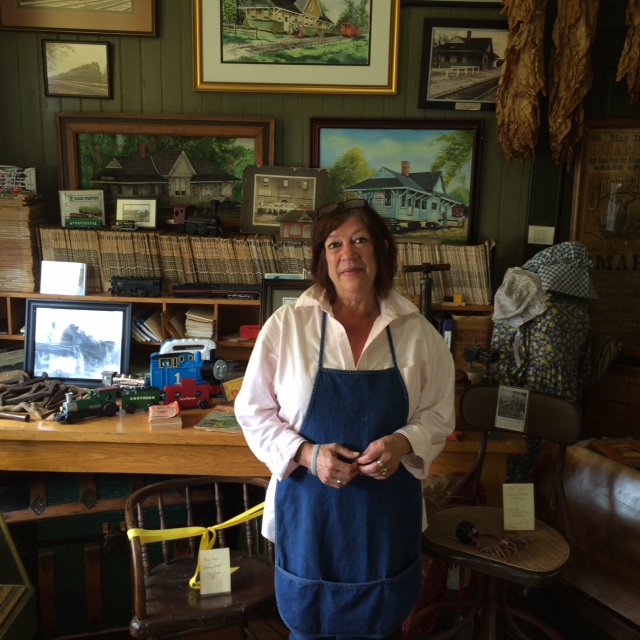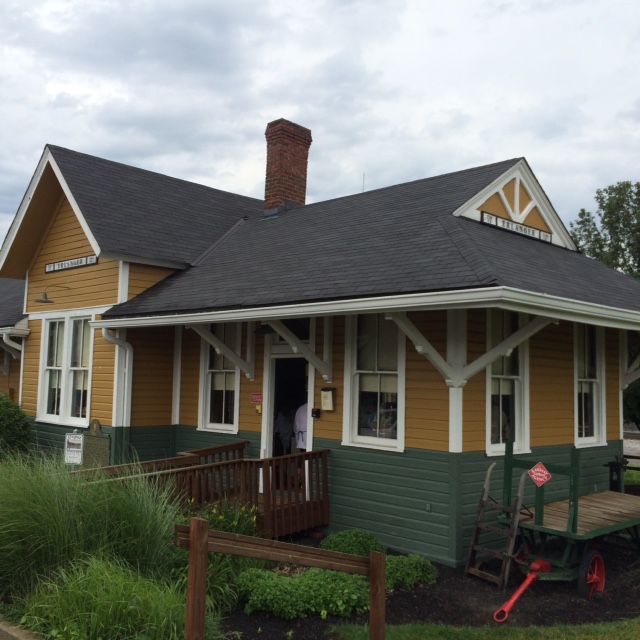By Terry Boehmker
NKyTribune reporter
There are no elaborate exhibits in the Erlanger Depot Museum, but every room has a hodgepodge of historical items that pique a visitor’s curiosity. It’s like going through the attic in your grandparent’s house and discovering keepsakes from past generations.
But the hundreds of items displayed in glass cases, hanging on walls and sitting on tables or shelves throughout the museum do have something in common.
“It all has some connection to the city of Erlanger,” said Michele Roszmann, the museum attendant. “Some of it’s just from families that have had long-term interest in the city, like these bathing suits we have from the 1890s. The bathing suits all came from the Tichenor family, and we have a Tichenor Middle School named after this gentleman who’s modeling one in the picture we have.”
There’s a story behind each item in the museum, and Roszmann seems to know them all. She’s a former teacher who enjoys sharing the history of the city and what she knows about the artifacts that are everywhere around her.
“The other fun thing for me,” Roszmann said, “is we have a Museum to Go Program where I take pieces from the museum into the classroom and do an hour or two-hour presentation on a certain subject.”
The museum building itself is an historic landmark. It’s a wooden railroad depot that was built in 1877 and remained in operation for nearly 100 years. The depot was going to be destroyed after the railroad closed it, but the Erlanger Historical Society came up with the funds to save it.
The building’s main room was the waiting area for railroad passengers. There are two adjacent rooms that were used as offices for depot employees and a large open area where freight was stored. Roszmann said the freight room still has its original wooden floor and large sliding door. That’s where goods and livestock were loaded on and off railroad cars.
“There were little stations all along the (railroad) line at that time and Erlanger was one of them,” Roszmann said. “There were stock pens here and two water towers. The steam engines always needed water and it was pumped here from a lake where the Silverlake recreation fields are now.”
After the Erlanger Historical Society bought the depot to preserve it for the city, the members decided to use it as a museum. The community responded to the idea by donating furniture, applicances, clothing, tools, toys, photographs and other paraphernalia from the past. Some items date back to the 1800s, including a women’s bonnet and a painting of Baron Fredrick Emile D’Erlanger, the city’s namesake. He was a German-born aristocrat and railroad owner who once owned the land where the city is now.
A stalk of cured tobacco hanging from the ceiling in one room of the museum is a relic from a slave-owning plantation on Dixie Highway that is now the Forest Lawn Memorial Park cemetery. In another room, there’s a lace-fringed wedding dress that was worn in the early 1900s. Vintage military uniforms donated by Erlanger residents who served in World War I and II are also on display.
Visitors can also see antique radios, televisions and typewriters, doll houses, model train sets and wooden high chairs as they walk through the museum. On one shelf, there are a couple six-packs of Erlanger Beer that was brewed in the 1970s. Everywhere you look, there’s bound to be something that catches your eye.
“One of the things the historical society does is research everything,” Roszmann said. “On Thursday mornings, I usually have a couple of volunteers who come in and work on whatever project we have going on.”
The museum is open 12-3 p.m. on Tuesdays and Thursdays and 12-5 p.m. on Saturdays. There is no admission charge, but donations are welcome.
Roszmann said the museum gets a yearly stipend from the city, but most of its operating budget comes from donations and fundraisers.
There will be a yard sale at the museum from 8 a.m. to 2 p.m. on Saturday, Aug. 8.


























